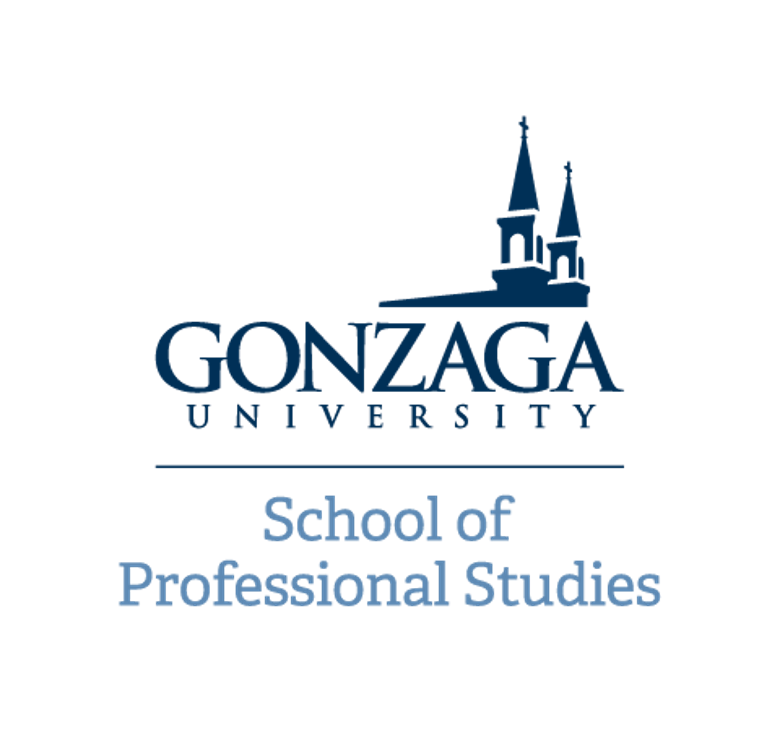Master of Arts
Organizational Leadership
What follows is the list of courses I studied during my masters degree program in the School of Professional Studies at Gonzaga University. Each section includes a short description of the course, along with the personal impact this course had for my leadership development.

ORGL 600
Foundations of Leadership
Dr. Michael Carey
This course marked my introduction into the ORGL program. The theoretical review of leadership comforted my analytical nature and helped to somewhat calm my nerves about starting school again. In retrospect, I now understand that I began my journey with the expectation I would find a well-defined recipe for leadership. I was anticipating something that I could study, memorize and then execute. The class discussions on traits, skills and styles helped me to refine my personal models of leadership in this regard. Yet, at the same time, I began to understand the concept of leadership as not only the execution of a singular set of traits, behaviors and stylistic tendencies, but also as a significant component of the personal relationships developed within the communities and groups I belonged to.
ORGL 605
Imagine, Create, Lead
Dr. Kristine Hoover; Dr. Adrian Popa; Mr. Mathew Rude
This immersion experience offered me an opportunity to connect with my classmates in a more personal and meaningful manner than I had anticipated, and I am extremely grateful this experience was at the start of my ORGL journey. My time on campus offered an introduction to the practice of pentimento, which was discussed as using Ignatian principles such as purposeful reflection and imagination to see and then see again our world. I have come to rely on this purposeful reflection to help me see again my understanding and my role within the groups I belong. This practice has been transformative in my growth as a leader and, importantly, as an individual.
ORGL 520
Negotiation & Conflict Resolution
Dr. Timothy Keator
This course afforded me an opportunity to understand violence in many new ways. Specifically, our class discussions on structural violence allowed a new world of understanding for me regarding oppression as it relates to organizational procedures, rules and cultures. Learning and discussion from this class experience continue to help me shape organizational policy making more holistically.
ORGL 615
Organizational Theory & Behavior
Dr. Dennis Conners
This course presented an opportunity to reflect on my current organizational challenges using system theory. As a computer science major and professional programmer, thinking logically about cause and effect is something I have done for years, however a formal study using systems thinking theory was not something I had previously been exposed to. Transitioning from a traditionally linear cause and effect model to a time based circular approach to the same was challenging and invigorating. The study of mental models and team learning combined with the concept of the learning organization discussed in The Fifth Discipline had a profound impact on my thoughts for the leadership struggles I am facing within my growing team. The learning and discussion from this experience was so impactful, it became the foundational basis for my leadership goals of my organizational team’s transformational growth.
ORGL 610
Communications and Leadership Ethics
Dr. Pavel Shlossberg
I found this course to be the first to where I began to apply learning and understanding from previous courses to the new material being discussed. In this regard, I had further opportunity to revisit and expand on my newly acquired understanding of structural violence from ORGL 520 as well as revisit and refine the concept of mental models from ORGL 615 as we discussed ethical dialog and its impact on purposeful dialog and organizational culture. This class afforded an extended opportunity to reflect on my personal moral basis and how this baseline impacts my personal experiences and connections with those I lead.
ORGL 517
Organizational Change & Transformation
Dr. Kristine Hoover
This course was extremely pragmatic and provided a much-appreciated opportunity to reflect on my organizational leadership challenges using several new to me diagnostic models. As my second immersion experience, I once again found the immersion time on campus extremely impactful as we discussed the challenges inherit in leading successful change within an organization. The GlobalTech simulation provided an excellent experience practicing change leadership in a safe environment (i.e. one where there are no real-world repercussions) and this model would become the basis for the timeline of my organizational team’s transformation.
ORGL 550
Team Building
Dr. Josh Armstrong
As an immersion experience, this class offered embedded layers within which to study and experience team formation and growth. As we came together as (mostly) strangers to study team formation and the various stages of group performance, we also experienced these concepts first hand. At this point in my ORGL journey, I had begun to clearly define an action plan for addressing the organizational challenges facing my team at the office and this course provided practical knowledge and experience that I continue to leverage today as I work at leading my growing team.
ORGL 551
Advanced Team Building
Dr. Josh Armstrong
This class offered an immediate opportunity to expand on the learning from ORGL 550 and further refine our skills as a group facilitator. The course, along with the instructors and my classmates, offered a space that was safe for experimentation in allowing me to practice the unique skills that I felt needed improvement to meet my team leadership and development objectives. Being part of a group activity and then being able to observe a debrief and quickly critique that experience has proven pragmatic in my organizational context and is a skill that I have continued to leverage with my team as I work through the timeline developed in ORGL 517 for my team's transformation.
ORGL 522
Leadership, Community, Empowerment, Collaboration and Dialogue
Dr. Michael Carey
As is expressed in my leadership philosophy, I believe that a significant aspect of successful leadership is accomplished via the relationship a leader maintains with the community within which they operate. The participant observer experience offered by this course allowed me a unique opportunity to reflect on and further refine these thoughts and from our class discussions at the abbey, I have concluded that an individual with a great deal of self-awareness, personal understanding and humility is required to lead and support a prosperous community. Yet, somewhat paradoxically, the individual’s growth and development in this regard is also fostered by that very same community. Remaining curious about this intercedence has guided my understanding of how I contribute to my organizational team and will continue guide my leadership practice into the future.

